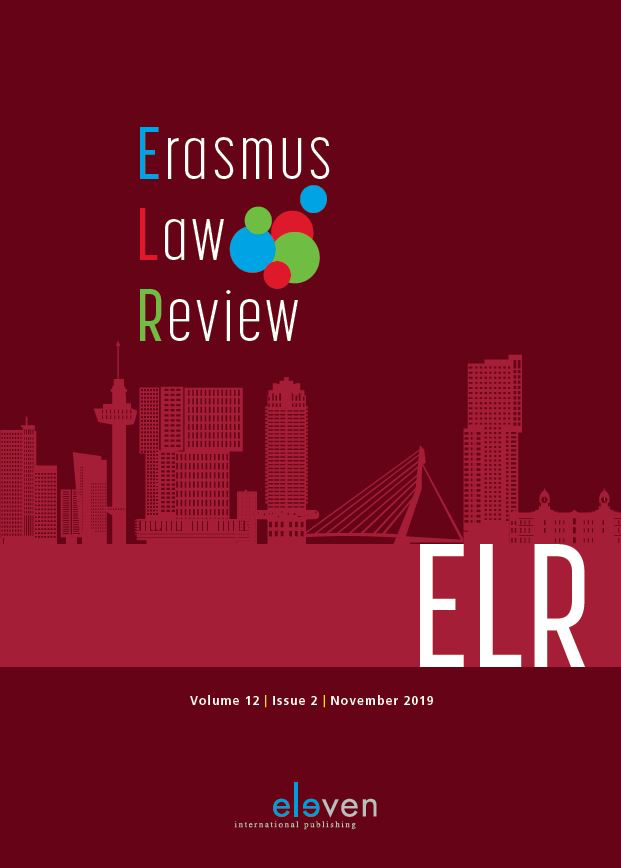|
This article evaluates the recently completed Base Erosion and Profit Shifting (BEPS) project of the G20 and OECD and offers some alternatives for reform. |


Erasmus Law Review
About this journalSubscribe to the email alerts for this journal here to receive notifications when a new issue is at your disposal.
| Article |
|
| Authors | Maarten Floris de Wilde |
| Author's information |
| Article |
|
| Keywords | tax avoidance, tax evasion, benefits principle |
| Authors | Reuven S. Avi-Yonah and Haiyan Xu |
| AbstractAuthor's information |
| Article |
|
| Keywords | flawed legislation, tax privileges, tax planning, corporate social responsibility, tax professionals |
| Authors | Hans Gribnau |
| AbstractAuthor's information |
|
The international tax system is the result of the interaction of different actors who share the responsibility for its integrity. States and multinational corporations both enjoy to a certain extent freedom of choice with regard to their tax behaviour – which entails moral responsibility. Making, interpreting and using tax rules therefore is inevitably a matter of exercising responsibility. Both should abstain from viewing tax laws as a bunch of technical rules to be used as a tool without any intrinsic moral or legal value. States bear primary responsibility for the integrity of the international tax system. They should become more reticent in their use of tax as regulatory instrument – competing with one another for multinationals’ investment. They should also act more responsibly by cooperating to make better rules to prevent aggressive tax planning, which entails a shift in tax payments from very expert taxpayers to other taxpayers. Here, the distributive justice of the tax system and a level playing field should be guaranteed. Multinationals should abstain from putting pressure on states and lobbying for favourable tax rules that disproportionally affect other taxpayers – SMEs and individual taxpayers alike. Multinationals and their tax advisers should avoid irresponsible conduct by not aiming to pay a minimalist amount of (corporate income) taxes – merely staying within the boundaries of the letter of the law. Especially CSR-corporations should assume the responsibility for the integrity of the tax system. |
| Article |
|
| Keywords | Fairness, international tax, legitimacy, BEPS, developing countries |
| Authors | Irene Burgers and Irma Mosquera |
| AbstractAuthor's information |
|
The aim of this article is to examine the differences in perception of ‘fairness’ between developing and developed countries, which influence developing countries’ willingness to embrace the Base Erosion and Profit Shifting (BEPS) proposals and to recommend as to how to overcome these differences. The article provides an introduction to the background of the OECD’s BEPS initiatives (Action Plan, Low Income Countries Report, Multilateral Framework, Inclusive Framework) and the concerns of developing countries about their ability to implement BEPS (Section 1); a non-exhaustive overview of the shortcomings of the BEPS Project and its Action Plan in respect of developing countries (Section 2); arguments on why developing countries might perceive fairness in relation to corporate income taxes differently from developed countries (Section 3); and recommendations for international organisations, governments and academic researchers on where fairness in respect of developing countries should be more properly addressed (Section 4). |
| Article |
|
| Keywords | GAAR, abuse, tax avoidance, BEPS, principal purpose test, legal certainty |
| Authors | Dennis Weber |
| AbstractAuthor's information |
|
The OECD BEPS Action 6 report contains a principal purpose test rule (PPT rule) for the purpose of combating abuse of tax treaties. This PPT rule is also included in the OECD Multilateral Instrument. |
| Article |
|
| Keywords | BEPS, value creation, tax structuring, international taxation |
| Authors | Paul Lankhorst and Harmen van Dam |
| AbstractAuthor's information |
|
The international tax landscape is changing and it is changing fast. The political perception is that taxation of multinational enterprises is not aligned with the ‘economic activity’ that produces their profits (i.e. not aligned with ‘value creation’). The perception links ‘value creation’ with ‘employees and sales’. |

 Issue 3
Issue 3